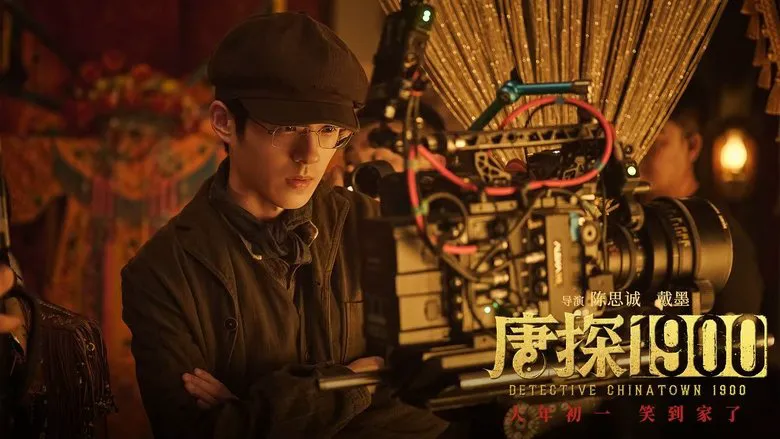A Decade of “Detective Chinatown”: From Triumph to Transformation
The “Detective Chinatown” franchise, since its inception in 2015, has become a notable fixture in Chinese cinema, culminating most recently with “Detective Chinatown 1900” in 2025. It stands as one of the few long-running domestic film series, aside from animated franchises like “Boonie Bears,” to achieve such sustained success. Its formula of releasing during prime holiday seasons, casting charismatic leads, and expertly blending comedic elements with intricate mystery plots has solidified its place as a box-office heavyweight. “Detective Chinatown 3” even broke records, achieving a remarkable single-day gross of 1 billion yuan, a milestone that remains unmatched.
However, “Detective Chinatown 3,” while commercially successful, also represented a turning point for the franchise. The film’s financial triumph was shadowed by significant critical feedback, ultimately contributing to the unexpected success of “Hi, Mom,” a sentimental dark horse at the box office.
“Detective Chinatown 1900”: A Bold Refresh
“Detective Chinatown 1900” demonstrates a clear effort to learn from the criticism levied against its predecessor, showcasing a distinct change in cinematic style and narrative direction. The story departs from the modern setting, transporting audiences to 1900s San Francisco, before the era of the famed Qin Feng and his comedic uncle, Tang Ren. Actors Liu Haoran and Wang Baoqiang take on the roles of their “ancestors”: Qin Fu, a descendant of traditional Chinese medicine practitioners, and Agui, a courageous and skilled character rooted in the local culture.
Character Evolution: A welcome change
The character dynamics are significantly revised in this installment. While Qin Feng’s inherent appeal stemmed from his sharp intellect and fascination with the idea of the seemingly impossible crime, combined with a taciturn nature due to his stutter, Qin Fu presents a stark contrast. He is articulate and quick-witted. Despite his initial inexperience as a translator and somewhat audacious claim of being a detective, his energetic, positive, and inherently lovable personality makes him difficult to dislike.
Wang Baoqiang’s transformation is even more pronounced. Agui is portrayed as an orphan raised among local indigenous people, inheriting a diverse skillset that includes communicating with animals, analyzing footprints and wounds, and even distinguishing male from female blood using his sense of smell. Remarkably, in times of dire need, he has the ability to inject himself with a substance that grants him temporary superhuman strength. Although Qin Fu is outwardly presented as the detective, Agui is, in reality, the engine driving their investigative success.
Smart Changes in Direction
This shift in character roles proves to be an intelligent maneuver, directly addressing two primary points of criticism leveled against “Detective Chinatown 3”: the reduction of Tang Ren to a comedic caricature and the over-reliance on somewhat base humor. The narrative in “1900” provides Agui with a more substantial and meaningful role, while simultaneously affording Liu Haoran the liberty to break away from the constraints of portraying a relentlessly serious genius, allowing him to showcase his inherent youthful charm and charisma. This revitalized dynamic injects a fresh spark into the familiar partnership.
A Shift in Comedy: More Subtlety
The altered approach to comedy, with less emphasis on exaggerated character portrayals solely for the sake of eliciting laughter, leads to a significantly enhanced viewing experience. One of the most memorable comedic sequences involves a magic show where the magician confidently invites audience members to take part in a disappearing act. Simultaneously, two opposing factions find themselves on the brink of an all-out brawl. The tables dramatically turn when the magician’s props unexpectedly whisk away the strongest members from one side, providing the opposing side with an opening to attack. However, the situation is in constant flux, as the “disappeared” members reappear just as suddenly, forcing the fighters onstage to feign peace.
The humor is significantly amplified by each character’s reaction to the unfolding absurdity. The audience members who are “lucky” enough to participate receive a thrilling show and rather intimate experience, while the magician is continually caught off guard by the shifting developments, yet must maintain his professional composure and sustain the illusion. The seamless integration of “transformation” and “performance” into the core action sequences makes for an unquestionably memorable film moment.
Listening to the Audience is Key
Understanding and responding meaningfully to audience feedback is fundamental to achieving enduring success in mainstream commercial cinema. Director Chen Sicheng clearly understands this principle, demonstrably evidenced by the improvements integrated into “Detective Chinatown 1900”. Despite facing stiff competition, the film has enjoyed both robust audiences and critical discussion, with its box office achieving over 3 billion yuan.
The “Product Manager” Director: Chen Sicheng
Chen Sicheng is sometimes characterized as a “product manager” director, with more adeptness to discern commercial opportunity than singular artistic creation. The “Detective Chinatown” is his most successful product. Each contribution has been carefully analyzed and assessed for success factors, like the surprising ending of the first film, the inquiry into people involved in the second, and also the revealing of mysterious person “Q” within the third.
The most importance is Casting
However, beyond these elements for easy replication elements, casting for main crews are more important. Wang Baoqiang and Liu Haoran would be the only secret weapon. Liu Haoran kept his youth looks and high-IQ. Wang Baoqiang are only for Agui roles. his characteristic and act honest. Audience link is powerful, and main character is influent from cast member.
The Chow Yun-fat casting in “1900” are also brilliantly. Both sophisticated businessman and miner are complex. He performed powerful closing scene that audience had touched.
A New Direction for Franchise
“Detective Chinatown 1900” open new opportunities by non-comedy and classic mystery. even if try successful, reproduce such discursion would be difficult. the next contribution would back to modern era and emphasis script. For domestic address tenth-anniversary is rare, hope “Detective Chinatown” continue create new content in next de